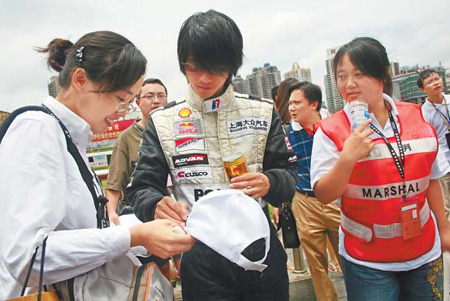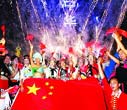Changing Life
Han Han: Voice of the post-80s generation
(China Daily)
Updated: 2009-08-20 10:13
This provocative criticism launched at least five of his books onto the bestseller lists.
One reader of Triple Gate wrote to the author, saying: "Han Han you're great! You've just said what I wanted to say."
He responded: "Then why didn't you say it?"
Guangzhou-based New Weekly magazine said in late 2008 that Han lives up to the duties and responsibilities of a public intellectual.
|
|
But Han rejects the praise, saying he just enjoys speaking out. He even enjoys the fact that many don't share his views. "When I started car-racing, I thought the slow drivers were foolish but later changed my mind; without them, how could I stand out?"
He has followed his own passions, and his entry into the racing world befuddled many who believe he has a promising future in writing.
They claimed he just wanted to flaunt his wealth or just sought some excitement like many young men with excessive testosterone.
At first, Han spent his own money on training and buying cars. Later, he was contracted to a professional team. And then he astonished the public by winning the 2007 China Circuit Championship.
"My success comes from my judgment, which is my gift. Some people will never know what they are really capable of. They just waste their lives doing something that they are not good at," he says.
Han enjoyed a carefree childhood in a small town in Shanghai's suburbs.
Unlike many Chinese parents who push their children to excel, his parents were relaxed about his schoolwork and studies.
He found a passion for reading as soon as he started to learn Chinese characters, hiding under his blankets to read at night.
His independent streak became obvious at an early age when he resisted his parents' attempts to control what they saw as bad habits or behavior, even on minor issues like keeping his desk tidy.
"They used to try to change me but never succeeded," Han says. "Then, they started to understand I always try my best to get what I want. Now, they support every decision I make."
His academic progress foundered in 1999, when he failed seven subjects, including Chinese, in high school. He spent another year trying to catch up but eventually decided to quit.
But before dropping out, he won the first New Concept national essay contest, which encourages innovative student writing. He also finished the manuscript for Triple Gate during class.
He told his teachers he would live on the royalties, and they all laughed at his "naivety".
But Triple Gate became a bestseller a month later and has since sold 1 million copies, making him a millionaire.
He believes "success is the mother of success".
He also makes money as a professional racer and from ad revenue from his blogs.
In order to encourage Chinese writers, he promises an above-average rate of 2,000 yuan ($293) per 1,000 Chinese characters printed in a new magazine he will edit.
He has been thinking about giving up racing and writing for some time.
"But I still have some goals that I haven't yet achieved and some 'enemies' I have to beat," he says.
His ideal life would be "staying in the right place with the right person".
"Every morning when we wake up, we have nothing to do and don't need to do anything," he says.
He admits to several relationships since he was 16 but is only now considering marriage.
"I don't want to be restricted by anything," Han says.
"But I believe that there is a greater power. When it appears, it will make me willing to take on the responsibility."
A reporter from the Beijing-based China Pictorial magazine once characterized his anti-establishment and individualistic character as "Westernized" and asked: "How did you become like this?"
"I don't think things can be called Easternized or Westernized," he responded.
"There is only one standard - whether it's suitable or not for human beings."
Ma Yimu, editor of the men's fashion magazine Esquire's Chinese edition, says: "Han Han is just a normal young man. He likes pretty women and says 'no' to things he thinks are wrong. If there were more Han Hans in China, the country would be more normal."
Han expresses the view through song lyrics from his only music album: "Happiness is being happy in different ways."








